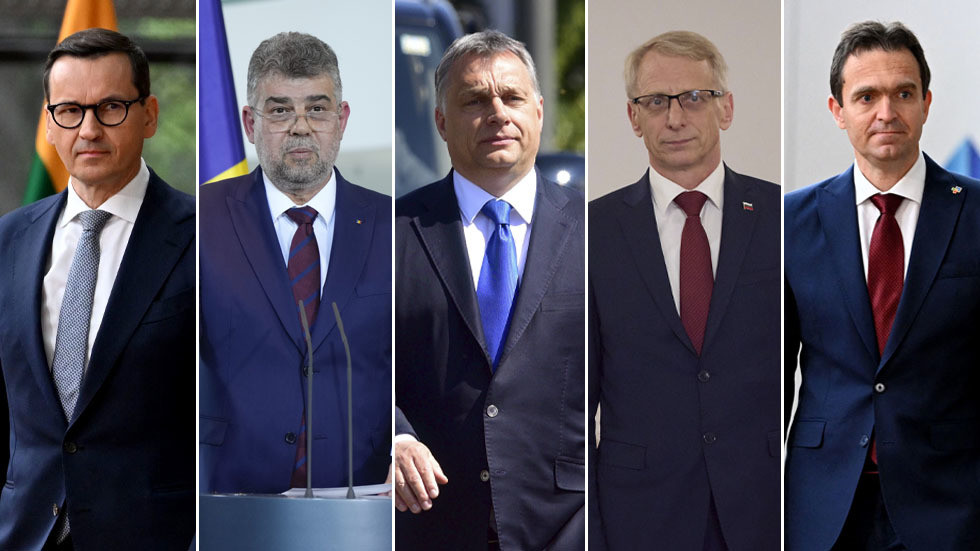
Brussels opted to end the union’s restriction on imports of Kiev’s grain but several member states immediately rejected the move

From left to right: Mateusz Morawiecki, Marcel Ciolacu, Viktor Orban, Nikolai Denkov, Ľudovit Odor. © Emmanuel Dunand / AFP; Global Look Press / Flashpic / Ukraine Presidency; Thomas Lohnes / Getty Images
A temporary moratorium on the import of Ukrainian wheat, corn, rapeseed, and sunflower seeds, imposed by the EU in early May, was lifted earlier this week. The move has split the eastern members of the bloc, with some voicing support for the decision and others vowing to defy the order.
Why was the ban on Ukrainian grain purchases initially imposed?
Earlier this year, several EU states voiced deep concerns over a massive influx of cheap agricultural produce from Ukraine, citing an urgent need to protect local markets from destabilization. In May, the European Commission (EC) imposed “exceptional and temporary preventive measures on imports” of Ukrainian wheat, maize, rapeseed, and sunflower seed to five member states, to ease the impact of plummeting prices in neighboring EU countries.
The ban allowed Ukrainian products to be transported through member states, but not sold or warehoused there. It was originally supposed to end in June but was extended through mid-September.
Which EU nations stopped importing the grain?
Substantial financial losses due to the glut of Ukrainian grain were particularly felt by the members of the bloc that share a border with Ukraine. However, several other nations have joined in demanding action from the EC over Ukrainian exports. The measures adopted by Brussels allowed Poland, Hungary, Romania, Slovakia, and Bulgaria to stop importing Ukrainian agricultural produce.
Why are they important for the shipping of Ukraine’s produce?
In July, Russia suspended its participation in the Black Sea Grain Initiative that allowed Ukrainian grain to be safely shipped from the country’s ports. The deal, initially clinched between Moscow and Kiev last year and brokered by the UN and Türkiye, was supposed to facilitate the delivery of Ukrainian grain to world markets amid the military conflict between the neighboring states.
The frontline members of the bloc were seen as a safe gate for exports of Ukrainian crops that, according to Brussels, were “critical to feed the world and keep food prices down.” However, the produce got stuck in Eastern Europe, endangering the livelihoods of local producers.
What are the reasons behind Brussels’ reversal of its decision?
The EU restrictions were lifted on Friday after Ukrainian authorities agreed to tighten control over its agricultural exports. In particular, Kiev pledged to introduce “legal measures” such as a 30-day licensing system, to avoid new surges in grain exports. The decision to eliminate the ban came after weeks of negotiations. Ukraine was even threatening to sue the bloc through the World Trade Organization for compensation.
What steps did opposing member states take?
Before the EC decision was announced, Poland and Hungary had warned that they would act alone to keep cheap Ukrainian grain out. Prime Minister Mateusz Morawiecki said on Friday that Warsaw would unilaterally block the import of agricultural produce from Ukraine, starting September 16.
Hungary, in turn, imposed an import ban on 24 Ukrainian products such as grain, rapeseed and sunflower seeds, as well as certain meat products, honey and eggs. Prime Minister Viktor Orban accused Brussels of “turning a blind eye” to the problems of European farmers, adding that Ukrainian crops “destined for Africa are flooding Central European markets.”
Meanwhile, the government of Slovakia decided to ban imports of Ukrainian wheat, corn, rapeseed and sunflower seeds. The country’s Prime Minister Ľudovit Odor said that Bratislava was forced to “prevent excessive pressure on the Slovak market” to remain fair to local farmers.
Why did Romania and Bulgaria support Brussels’ decision despite obvious negative impact on their agricultural sectors?
Bulgaria became a notable exception, after deciding to lift the embargo even before the EC’s step was announced. Finance Minister Asen Vassilev said the ban had deprived the government of tax revenue and led to higher food prices. The country’s losses in value-added tax alone reportedly amounted to €74.6 million (almost $80 million). Sofia expected to further lose €20.4 million every month if the embargo was extended.
As a result, more than 20 Bulgarian agricultural associations have pledged to stage a national protest starting September 18. The farmers claim that imports of Ukrainian agricultural produce are disastrous and would destroy the Bulgarian agricultural sector.
Meanwhile, Romanian Prime Minister Marcel Ciolacu has called for supporting Ukrainian grain exports, saying that his nation will try to boost the volume of traffic through Romania from two million to four million tons. He also highlighted the importance of establishing a mechanism to compensate Romanian farmers for their losses until the next harvest.
For more stories on economy & finance visit RT’s business section




